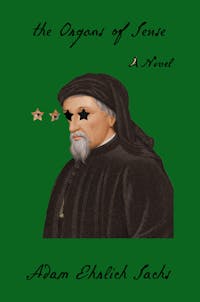The Organs of Sense
A Novel
 Download image
Download image
ISBN10: 0374227373
ISBN13: 9780374227371
Hardcover
240 Pages
$26.00
CA$34.00
In 1666, an astronomer makes a prediction shared by no one else in the world: at the stroke of noon on June 30 of that year, a solar eclipse will cast all of Europe into total darkness for four seconds. This astronomer is rumored to be using the longest telescope ever built, but he is also known to be blind—and not only blind, but incapable of sight, both his eyes having been plucked out some time before under mysterious circumstances. Is he mad? Or does he, despite this impairment, have an insight denied the other scholars of his day?
These questions intrigue the young Gottfried Leibniz—not yet the world-renowned polymath who would go on to discover calculus, but a nineteen-year-old whose faith in reason is shaky at best. Leibniz sets off to investigate the astronomer’s claim, and over the three hours remaining before the eclipse occurs—or fails to occur—the astronomer tells the scholar the haunting and hilarious story behind his strange prediction: a tale that ends up encompassing kings and princes, family squabbles, obsessive pursuits, insanity, philosophy, art, loss, and the horrors of war.
Written with a tip of the hat to the works of Thomas Bernhard and Franz Kafka, The Organs of Sense stands as a towering comic fable: a story about the nature of perception, and the ways the heart of a loved one can prove as unfathomable as the stars.
Reviews
Praise for The Organs of Sense
"Adam Ehrlich Sachs's The Organs of Sense is layers-deep. At its core it's a story of a 1666 encounter between a young Gottfried Leibniz and a blind astronomer who makes the unlikely prediction of a solar eclipse . . . It is at once a pitch-perfect send-up of an overwrought philosophical tract and a philosophical tract in its own right—meaty, hilarious, and a brilliant examination of intangible and utterly human mysteries."—Arianna Rebolini, BuzzFeed News
"In his sublime first novel . . . which recalls the nested monologues of Thomas Bernhard and the cerebral farces of Donald Antrim, [Adam Ehrlich] Sachs demonstrates the difficulty of getting inside other people’s heads (literally and figuratively) and out of one’s own . . . How it all comes together gives the book the feel of an intellectual thriller. Sachs’s talent is on full display in this brilliant work of visionary absurdism."—Publishers Weekly (starred review)
"This impressive debut is for fans of George Saunders and Vladimir Nabokov . . . [it is] filled with delightful tales of palace intrigue, sibling rivalry, and extensive forays into empirical thought and logic. Deep philosophy is applied to nearly everything that pops up, including the eating of soup. Yet despite these heavy themes, Sachs applies a liberal does of clever humor throughout; nearly everyone is a charlatan in what might be the most lighthearted work about the history of science ever published."—Library Journal (starred review)
BOOK EXCERPTS
Read an Excerpt
ONE
IN AN ACCOUNT sent to the Philosophical Transactions but for some reason never published there, or anywhere else, a young G. W. Leibniz, who throughout his life was an assiduous inquirer into miracles and other aberrations...

